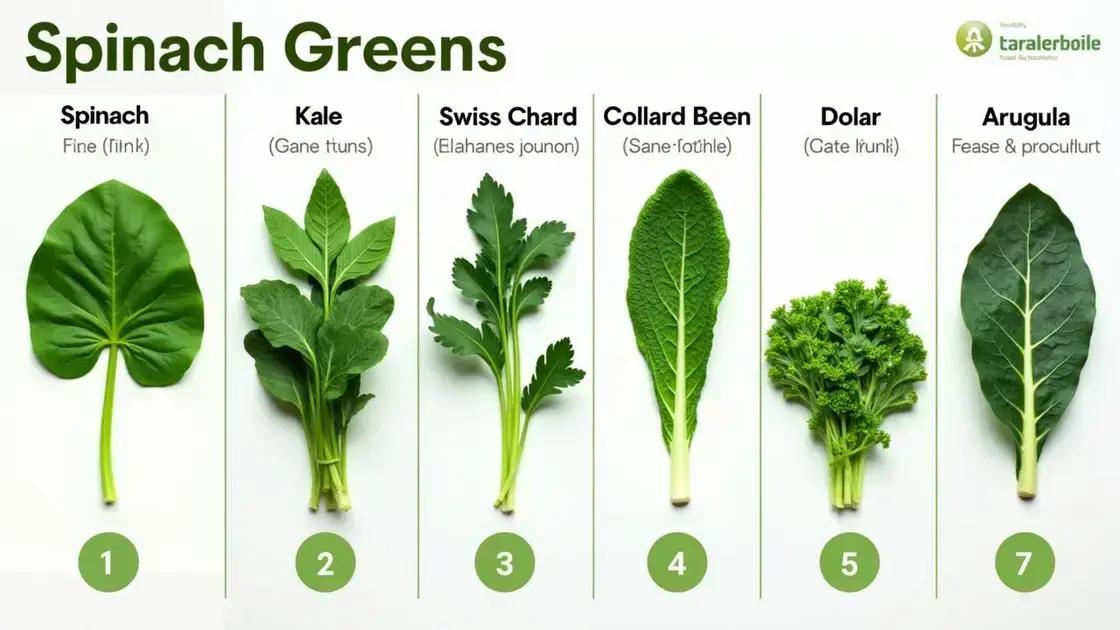Dark leafy greens, such as spinach, kale, and Swiss chard, are nutrient-rich foods that provide numerous health benefits, including improved heart health, digestion, and weight management. Incorporating these greens into your diet can enhance your overall nutritional intake while offering versatility in meal preparation.
Dark leafy greens are essential to a balanced diet, providing a rich source of vitamins, minerals, and antioxidants. By incorporating greens like spinach, kale, and collard greens into your meals, you can significantly enhance your nutritional intake. These vegetables are not only packed with nutrients, but they also offer numerous health benefits, including improving heart health and supporting digestion. In this article, we will explore the nutritional profile, health benefits, and practical ways to include dark leafy greens in your everyday diet.
Nutritional Profile of Dark Leafy Greens

Dark leafy greens are nutritional powerhouses, offering a wide range of vitamins and minerals that are essential for good health. A typical serving of greens such as spinach, kale, or Swiss chard can provide significant nutrition.
Vitamins and Minerals
These vegetables are rich in Vitamin A, which supports eye health and immune function. Additionally, they are high in Vitamin K, crucial for blood clotting and bone health. Dark leafy greens also provide significant amounts of Vitamin C, an antioxidant that aids in tissue repair and enhances iron absorption.
Fiber Content
Dark leafy greens are an excellent source of dietary fiber, which promotes healthy digestion. A high-fiber diet can help prevent constipation and contribute to overall gut health.
Antioxidants
These greens also contain a wealth of antioxidants, which help combat oxidative stress in the body. Compounds like flavonoids and carotenoids contribute to their vibrant colors and support overall health.
Low Caloric Density
One of the best aspects of dark leafy greens is their low caloric density. This means you can consume a large volume without adding significant calories to your diet, making them ideal for weight management. Their high water and fiber content can help you feel full longer.
Health Benefits of Consuming Greens

Consuming dark leafy greens offers a multitude of health benefits that contribute to overall well-being. By incorporating these greens into your diet, you can enjoy substantial improvements in both physical and mental health.
Heart Health
Dark leafy greens are known to be heart-friendly. They help lower blood pressure and reduce cholesterol levels due to the presence of potassium and fiber. Regular consumption may lessen the risk of heart disease.
Bone Strength
The high levels of calcium and Vitamin K in dark leafy greens are crucial for maintaining strong bones. These nutrients work together to improve bone density and prevent bone-related diseases like osteoporosis.
Improved Digestion
Thanks to their high fiber content, leafy greens promote healthy digestion. Fiber aids in regular bowel movements and helps maintain a healthy gut microbiome, which is essential for overall digestive health.
Weight Management
Dark leafy greens are low in calories but high in volume. This means they can fill you up without adding excessive calories, making them ideal for those looking to manage their weight. Incorporating greens into meals can help control hunger and reduce snacking on unhealthy foods.
Enhanced Immunity
Rich in antioxidants and vitamins, these greens help boost the immune system. Regular intake can help your body fight off infections and illnesses, keeping you healthier over time.
Incorporating Dark Leafy Greens Into Your Diet

Incorporating dark leafy greens into your diet can be easy and enjoyable. Here are some practical tips to ensure you’re getting the most out of these nutritional powerhouses.
Start Smooth
One of the best ways to include dark leafy greens is by adding them to smoothies. Blend spinach or kale with fruits like bananas and berries. This creates a tasty drink packed with nutrients without altering the flavor much.
Salad Base
Use dark leafy greens as a base for salads. Mix kale, arugula, or Swiss chard with other vegetables, nuts, and your favorite dressing. They provide a hearty and nutritious foundation for any salad.
Cooking Options
Cook dark leafy greens to enhance their flavor and nutrient absorption. Options include stir-frying, sautéing, or even steaming them. Pairing them with garlic and olive oil can add a delicious twist.
Soups and Stews
Add dark leafy greens to soups and stews. Not only do they enrich the flavor, but they also boost the nutritional value. Toss in some spinach or collard greens just before serving for added freshness.
Creative Snacks
For a nutritious snack, consider making kale chips. Toss kale leaves with olive oil and your favorite seasonings, then bake until crispy. This makes a crunchy, healthier alternative to regular chips.
Comparative Analysis of Leafy Greens

When comparing dark leafy greens, it’s important to consider their nutritional profiles, flavors, and common uses. Below is a breakdown of some popular leafy greens.
Spinach
Spinach is rich in Vitamin A, Vitamin C, iron, and calcium. It has a mild flavor and can be easily incorporated into salads, smoothies, and cooked dishes. Its high iron content makes it an excellent choice for vegetarians.
Kale
Kale, known for its hearty texture, is loaded with Vitamin K and antioxidants. It has a stronger taste than spinach, making it perfect for robust salads and sautéed dishes. Kale can also be used to make nutrient-dense kale chips, which provide a healthy snack alternative.
Swiss Chard
Swiss chard boasts a unique flavor and vibrant colors. It is a fantastic source of magnesium and Vitamin K. Swiss chard can be enjoyed raw in salads or cooked, adding a slight sweetness to dishes.
Collard Greens
Collard greens are packed with fiber and calcium. They have a slightly bitter taste and are often used in Southern cooking. Collard greens can be simmered or sautéed for a nutritious side dish.
Arugula
Arugula offers a peppery flavor and is high in Vitamin K and calcium. It is ideal for salads or as a topping on pizzas and sandwiches, adding a zesty kick to any meal.
In Summary: The Importance of Dark Leafy Greens
Dark leafy greens play a crucial role in boosting nutritional intake and enhancing overall health. With their rich profiles of vitamins, minerals, and antioxidants, they offer numerous health benefits, including improved heart health, digestion, and immune support.
By incorporating various types of leafy greens into your meals, such as spinach, kale, and Swiss chard, you can enjoy diverse flavors and textures. Furthermore, understanding and comparing the nutritional aspects of different greens can help you make informed choices for a healthier diet.
Ultimately, embracing dark leafy greens in your diet is a simple yet effective way to elevate your health and wellness journey.
FAQ – Frequently Asked Questions about Dark Leafy Greens
What are the health benefits of consuming dark leafy greens?
Dark leafy greens are packed with vitamins, minerals, and antioxidants, promoting heart health, improved digestion, and strengthened immunity.
How can I incorporate leafy greens into my diet?
You can include leafy greens in smoothies, salads, soups, and stir-fries. They can also be roasted or made into chips for snacks.
Which leafy greens are the most nutritious?
Spinach, kale, Swiss chard, collard greens, and arugula are among the most nutritious leafy greens, each offering unique health benefits.
How do dark leafy greens aid in weight management?
These greens are low in calories but high in fiber and water content, helping you feel full while providing essential nutrients.
Are there any downsides to consuming dark leafy greens?
Some individuals may experience digestive issues from high fiber intake or have specific dietary restrictions related to vitamin K.
How do I best store leafy greens to maintain freshness?
Keep greens in the refrigerator in a sealed bag or container. Wash them only before use to prevent moisture buildup.













